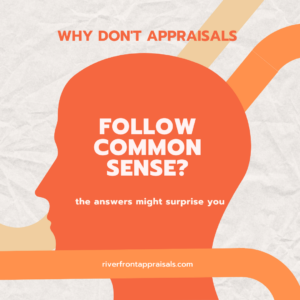
Property Taxes Just Went Up? We’ve Got You Covered!
It’s reassessment season for most folks in our area. Homeowners

School is in session.
In this blog post – which is part two of a three-part series called ‘Appraisal 101’, we will be exploring the concept of market value.
In case you missed part one, click here to learn the basics of the terms appraisal and appraiser.
Appraisers deal with multiple types of value, but in this post, we’re going to focus only on market value. For most assignments, we are asked to develop an opinion of market value.
[bctt tweet=”Market value may be one of the most misunderstood concepts in real estate appraisal. ” username=”RiverfrontApp1″]
So let’s jump in and start with a definition.
While there are slightly different definitions of market value, the most commonly used definition is from Fannie Mae (one of the two largest purchasers of mortgages):Market value is the most probable price that a property should bring in a competitive and open market under all conditions requisite to a fair sale, the buyer and seller, each acting prudently, knowledgeably and assuming the price is not affected by undue stimulus. Implicit in this definition is the consummation of a sale as of a specified date and the passing of title from seller to buyer under conditions whereby:
The two most important things to remember from the definition above is that (1) the buyer and seller must be typically motivated. This means that if any party is acting under duress, or if one party is motivated substantially more or less than another party, the definition of market value is not met. And (2) both parties must be well informed. If an out-of-town purchaser, for example, makes an offer on a home without checking out the neighborhood or researching local market values, they would not be considered well informed.
So what does all of this mean to the homeowner?
The main takeaway from this post is that appraisers do not set market value, nor do they justify it. In a typical refinance or purchase transaction, an appraiser is contracted to develop an opinion of market value. This is an opinion of what market participants are saying and doing. Market value is consumer-driven!
A licensed or certified appraiser is the only one who can complete an appraisal on your home. If you have any questions or need an appraisal, contact us today. We love to help!
Helping homeowners navigate the appraisal process,
Ryan Bays, SRA, AI-RRS

It’s reassessment season for most folks in our area. Homeowners

I feel like we all need a laugh. How about

So this may be a slight break from the norm,
Riverfront Appraisals has been providing comprehensive valuations of residential properties to Western Kentucky and Southwestern Indiana since 2008.